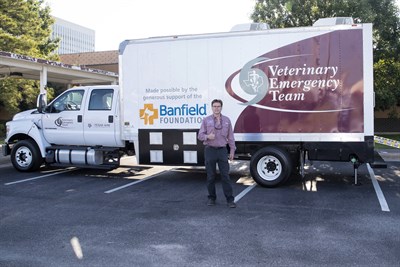Texas A&M Veterinary Emergency Team, AgriLife Deploy To California To Offer Wildfire Relief

The Texas A&M Veterinary Emergency Team (VET) and agents from the Texas A&M AgriLife Extension Service are traveling to California to offer medical and oversight relief to shelters housing around 700 companion animals displaced because of the Paradise wildfires that began in November.
Team members departed from College Station on Thursday morning for the team’s first out-of-state deployment, which also will support the ongoing recovery efforts by assisting with the reunification efforts. They anticipate returning in early January.
“We will be continuing care for burn patients and playing an advisory role for issues that are traditionally involved with bringing large numbers of animals together (in a shelter),” said Dr. Wesley Bissett, VET director and associate professor of emergency management in the Texas A&M College of Veterinary Medicine & Biomedical Sciences (CVM), who has already traveled to California to assist in creating a sheltering plan that, while not species specific, was more oriented toward California’s large animal population.
“We also anticipate seeing a lot of stress-related issues in the sheltered animals,” he said. “For example, if a cat has lived with a couple for all of its life and all of the sudden that couple’s not there on a daily basis—the cat’s not in its own home; it’s in a different environment—when there are 699 animals it is not familiar with in that new space, and add to that the trauma of the experience—it creates a lot of stress for the animal.”
Because fewer than half of the sheltered animals have been identified as owned, members of the Texas A&M convoy hope to establish a mechanism for reconnecting pets with their owners, who may not even be aware that their animal survived.
Bissett sees the deployment as an opportunity for the two units from the Texas A&M System to come together to help solve the state and the nation’s problems.
“AgriLife Extension has a history of managing large-scale animal support operations. These agents are experienced in setting up and managing different aspects of these emergency shelters, so our deployment will be building on the strengths we both bring to the table,” Bissett said. “We know from deploying in Texas with AgriLife Extension that when we work together, that’s the most powerful response that we can have.
“We also are grateful for the opportunity to offer some much-needed relief to our response colleagues in California who have been working in the field for more than a month,” Bissett said.
###
For more information about the Texas A&M College of Veterinary Medicine & Biomedical Sciences, please visit our website at vetmed.tamu.edu or join us on Facebook, Instagram, and Twitter.
Contact Information: Megan Palsa, Executive Director of Communications, Media & Public Relations, Texas A&M College of Veterinary Medicine & Biomedical Science; mpalsa@cvm.tamu.edu; 979-862-4216; 979-421-3121 (cell)


